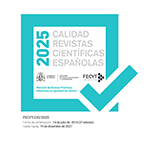‘Incidental + Intentional’ vs ‘Intentional + Incidental’ Vocabulary Learning: Which is More Effective?
Abstract
This study compares the effectiveness of two combinations of new vocabulary learning techniques: ‘incidental + intentional’ and ‘intentional + incidental’. For the incidental part, the participants viewed 3 hours of captioned authentic videos, whereas for the intentional one they were asked to do a set of tasks with the target vocabulary at home. Three aspects of the target words were tested: form recognition, meaning recall and written use in a sentence. The overall scores revealed better performance of the ‘incidental + intentional’ condition in the three tests. Nevertheless, a variety of scores in the sample for the three aspects of word knowledge and the lack of statistical evidence did not allow us to conclude with certainty which combination is more or less effective for new vocabulary learning.
Downloads
Article download
License
In order to support the global exchange of knowledge, the journal Complutense Journal of English Studies is allowing unrestricted access to its content as from its publication in this electronic edition, and as such it is an open-access journal. The originals published in this journal are the property of the Complutense University of Madrid and any reproduction thereof in full or in part must cite the source. All content is distributed under a Creative Commons Attribution 4.0 use and distribution licence (CC BY 4.0). This circumstance must be expressly stated in these terms where necessary. You can view the summary and the complete legal text of the licence.









